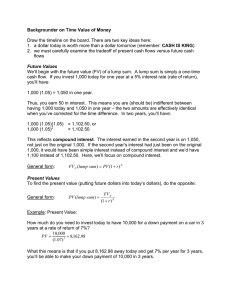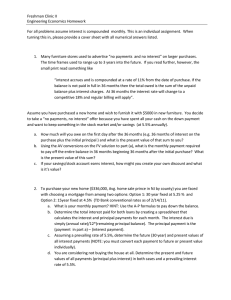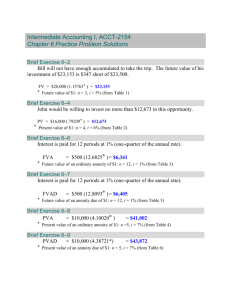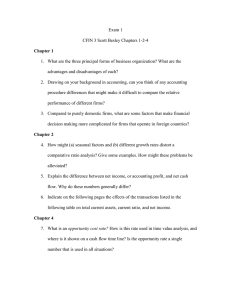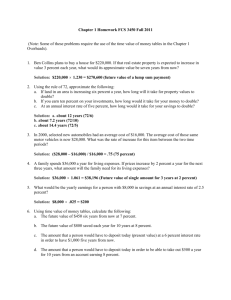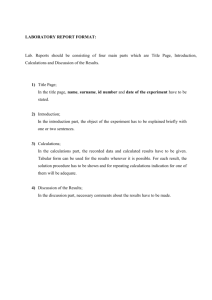CS108 Assignment 2: Method Implementation Learning Objectives
advertisement
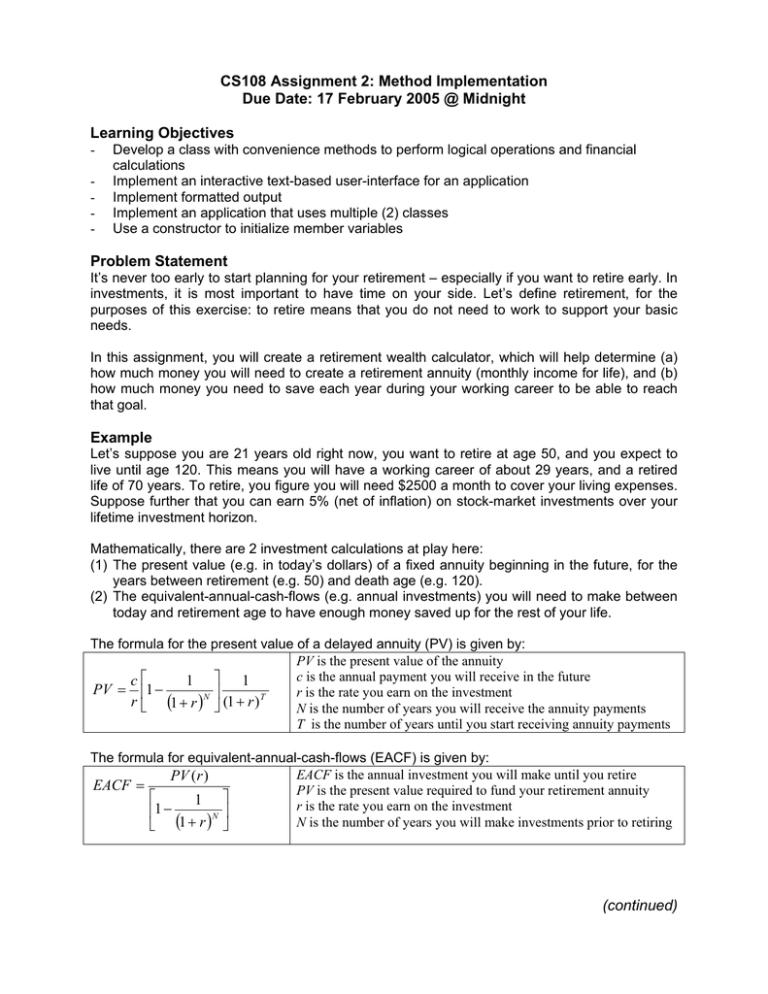
CS108 Assignment 2: Method Implementation Due Date: 17 February 2005 @ Midnight Learning Objectives - Develop a class with convenience methods to perform logical operations and financial calculations Implement an interactive text-based user-interface for an application Implement formatted output Implement an application that uses multiple (2) classes Use a constructor to initialize member variables Problem Statement It’s never too early to start planning for your retirement – especially if you want to retire early. In investments, it is most important to have time on your side. Let’s define retirement, for the purposes of this exercise: to retire means that you do not need to work to support your basic needs. In this assignment, you will create a retirement wealth calculator, which will help determine (a) how much money you will need to create a retirement annuity (monthly income for life), and (b) how much money you need to save each year during your working career to be able to reach that goal. Example Let’s suppose you are 21 years old right now, you want to retire at age 50, and you expect to live until age 120. This means you will have a working career of about 29 years, and a retired life of 70 years. To retire, you figure you will need $2500 a month to cover your living expenses. Suppose further that you can earn 5% (net of inflation) on stock-market investments over your lifetime investment horizon. Mathematically, there are 2 investment calculations at play here: (1) The present value (e.g. in today’s dollars) of a fixed annuity beginning in the future, for the years between retirement (e.g. 50) and death age (e.g. 120). (2) The equivalent-annual-cash-flows (e.g. annual investments) you will need to make between today and retirement age to have enough money saved up for the rest of your life. The formula for the present value of a delayed annuity (PV) is given by: PV is the present value of the annuity c is the annual payment you will receive in the future c 1 1 PV = 1 − r is the rate you earn on the investment r (1 + r )N (1 + r ) T N is the number of years you will receive the annuity payments T is the number of years until you start receiving annuity payments The formula for equivalent-annual-cash-flows (EACF) is given by: EACF is the annual investment you will make until you retire PV (r ) EACF = PV is the present value required to fund your retirement annuity 1 r is the rate you earn on the investment 1 − N N is the number of years you will make investments prior to retiring ( ) + 1 r (continued) Requirements Your application will take the form of 2 classes: - - The FinancialCalculator class, which will implement the financial calculations. o This class will have member variables for all of the variables required for the financial calculations. All member variables will be initialized via the constructor. o Accessor (get) and mutator (set) methods to get and set the several variables required in the calculations. o A clear method, which will reset all numeric values to 0. o Two convenience methods: calculatePV and calculateEACF, which will implement the PV and EACF calculations, respectively. Before performing any calculations, check to make sure the inputs are not zero or negative. The RetirementPlanner class, which will implement the interactive user-interface. o This class will have a single member variable named calc, which is a reference to an instance of the FinancialCalculator class, and which will be initialized via the constructor. o The promptUserForInput method will ask the user a series of questions, collect each of the inputs, set the inputs on the FinancialCalculator object, and call the calculate methods. o The displayResults method will call the getPresentValue() and getEACF() methods of the FinancialCalculator object, test the return values to see if they are non-zero, and print out a formatted display of the results. o The main method will create the reference to the RetirementPlanner object, and call the promptUserForInput and displayResults. Deliverables - The java code file(s) (*.java). - A short executive summary, which will serve to introduce the application. Grading Criteria - Correct syntax, no compile errors, good formatting, follow naming conventions, appropriate comments in the code Accessor, mutator, and constructor methods work correctly Implementation of financial equations/calculations* User interface methods to collect input Prints correct output to the screen Executive summary document * If you get totally stuck on these equations, I’ll give them to you. Questions? Bring them to class, or email me, azs@bu.edu. 20% 10% 10% 20% 20% 20%
